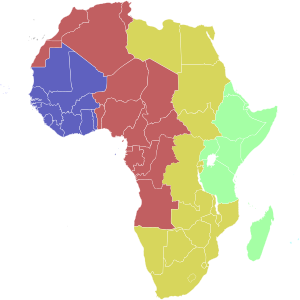UTC−01:00
Appearance
This article needs additional citations for verification. (December 2009) |
| UTC−01:00 | |
|---|---|
| Time zone | |
 World map with the time zone highlighted | |
| UTC offset | |
| UTC | UTC−01:00 |
| Current time | |
| 20:03, 30 November 2024 UTC−01:00 [refresh] | |
| Central meridian | |
| 15 degrees W | |
| Date-time group | |
| N | |


| Light Blue | Cape Verde Time[a] (UTC−1) |
| Blue | Greenwich Mean Time (UTC) |
| Red | (UTC+1) |
| Ochre | (UTC+2) |
| Green | East Africa Time (UTC+3) |
| Turquoise | (UTC+4) |
b Mauritius and the Seychelles are to the east and north-east of Madagascar respectively.
UTC−01:00 is an identifier for a time offset from UTC of −01:00.
As standard time (Northern Hemisphere winter)
Atlantic Ocean
- Greenland
- Ittoqqortoormiit and surrounding area
- Portugal
- Azores islands
As daylight saving time (Northern Hemisphere summer)
North America
- Greenland (summer)[1]
- Except areas around Danmarkshavn, and Pituffik (Thule)
As standard time (year-round)
Africa
Atlantic Ocean
Anomalies
Regions in UTC−02:00 longitudes using UTC−01:00 time
- The westernmost part of legal UTC-01:00 area in Ittoqqortoormiit Municipality (East Greenland)
- Azores islands (Portugal)
- Cape Verde
Areas in UTC−01:00 longitudes using other time zones
Using UTC−02:00
- The easternmost tip of Greenland (excluding legal UTC-1 and UTC±0 areas)
Using UTC±00:00
In Africa:
- Liberia
- Sierra Leone
- Guinea
- Guinea-Bissau
- Senegal
- The Gambia
- Sahrawi Arab Democratic Republic (disputed territory)
- Most of Mauritania
- Southwesternmost part of Mali
- The very westernmost part of Ivory Coast
In Atlantic Ocean:
- Madeira (Portugal)
- Canary Islands (Spain)
In Europe:
- Most of Iceland, except the westernmost part, including northwest peninsula and main town of Ísafjörður (lies in "physical" time UTC-2)
- Most of Portugal, west of 7.5ºW, except the easternmost part, including cities such as Bragança and Guarda (lies in "physical" UTC)
- Northeastern part of Greenland, including Danmarkshavn
- The western part of Ireland, west of 7.5ºW, including the cities of Cork, Limerick, and Galway
- Westernmost tip of Northern Ireland, including the county town of County Fermanagh, Enniskillen
- Westernmost island of the Faroe Islands (autonomous region of the Danish Kingdom), Mykines
- Extreme westerly portion of the Outer Hebrides, in the west of Scotland; for instance, Vatersay, an inhabited island and the westernmost settlement of Great Britain, lies at 7°54'W. If uninhabited islands or rocks are taken into account St Kilda, west of the Outer Hebrides, at 8°58'W, and Rockall, at 13°41'W, should be included.
Using UTC+01:00
In Africa:
- Southwestern part of Morocco, including Casablanca
- Most part in Moroccan Sahara (excluding parts occupied by Sahrawi Arab Democratic Republic which use UTC+00:00)
In Europe:
References
- ^ Girma, Lebawit Lily (March 24, 2023). "Greenland Solves the Daylight Saving Time Debate". Bloomberg.com. Retrieved March 28, 2023.
External links
 Media related to UTC−01:00 at Wikimedia Commons
Media related to UTC−01:00 at Wikimedia Commons
